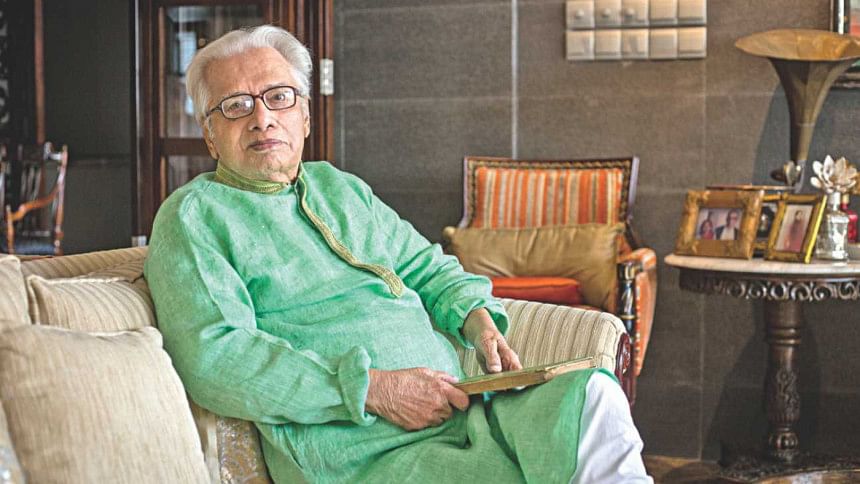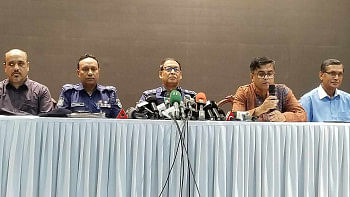Dr Ashraf Siddiqui – his take on fables and folklores of Bengal

Little did I know that my rendezvous with the eminent writer would exceed the scheduled time only because I would be mesmerised by the stories he narrates!
Time stopped somewhere, as I travelled with the author to lands far- far away!
Dr Ashraf Siddiqui is as sociable as we expect a folklorist to be. Well into his 90s, he accurately remembers all the minute details of his life because according to the master "everything is important."
Our tête-à-tête began with a dive behind importance of preserving of folktales. It must be mentioned here that the writer is a celebrated poet and novelist with a chest full of 100 plus books under his authorship.
He is also the author of 'Taleb Master,' a heart wrenching character fighting against the pangs of famine. This character was created right after Dr Siddiqui read the story of a rural teacher dying along with his entire family during the famine of the 40s because the teacher did not have enough means to feed his family.
Even with so many credits under his belt we wonder why the maestro ventured into the field of make-believe? A field mostly explored and read by children?
"I might disagree a bit to this assertion," said Dr Siddiqui. "Folk tales are not only meant for the younger generation, but for everyone. It is true that the youngest amongst us listen to them with the most eager minds; the elderly can also get equal satisfaction reading the tales from their childhood. Sometimes it helps us to remind ourselves that goodness in the world still prevails and that good always wins over the bad," adds Dr Siddiqui.
Discussing further on how age-old traditions are almost on the verge of dying out, the eminent writer slightly paused before acknowledging, "It is definitely a great tragedy. But a united effort will definitely help us revive the tradition. Folk tales have their roots embedded in the warmth like that of a mother; it is more like a simile. If all the womenfolk in our country, especially the mothers and the aunts, began telling the tales to their children again, just like old times, this tradition would never die out. In fact I believe this will help create a generation of successful human beings who truly believe in humanity, love and devotion. Because folk tales and fables are all about these!"
Further inquiry into what kept him enchanted with folklores; he gives most of the credit to Shantiniketan.
"In my childhood, my beloved mother narrated to me all the famous and breathtaking folk tales, but it was not until much later that I gave serious thought to them - reading and appreciating the unique stories and recognising the necessity of preservation to ensure the survival of the heritage," confesses Dr Siddiqui.
He also talks about the details of his life at Shantiniketan. "It was the best time of my life! This is when I developed a strong patriotic feeling towards Bengal, the green pasture of the campus, the serene classes beneath the trees. The gentle breeze blowing across the field spurred a deep-rooted affinity."
"Later when I left for my higher studies in America, I took up folklore studies as major and linguistics as minor at the Indiana State University, and the patriotic impression was amplified. And hence my work began in this field," remembered Dr. Siddiqui.
The eminent folklorist spent hours in the campus library rummaging through hoards of folk stories from all over the world. He re-read each piece to get the accurate picture and understand the depth behind the stories.
Dr. Ashraf Siddiqui ended our conversation with essential points to ponder upon -
"Folktales have the same root as winter cakes," he said, "Made with all the love and affection of a mother. These tales allow us to regain belief in humanity, strengthen family bonds, and increase our love and affection towards animals and all other living beings."
"Maybe the lack of time and folktales in our lives has encouraged so many to pursue the wrong and lose hope in humanity. Maybe it is high time we gave some thought to this aspect and helped revive the culture - that helped countless generations before us become good human beings, first."
Life altering or not, we have definitely been able to spend plentiful enjoyable hours with our loved ones, creating cherished memories, creating a special bond, that is second to none, over lilting orations of our favourite folktales.
Thus my story endeth,
The Natiya-thorn withereth.
"Why, O Natiya-thorn, dost wither?"
"Why does thy cow on me browse?"
"Why, O cow, dost thou browse?"
"Why does thy neat-herd not tend me?"
"Why, O neat-herd, dost not tend the cow?"
"Why does thy daughter-in-law not give me rice?"
"Why, daughter-in-law, dost not give rice?"
"Why does my child cry?"
"Why, O child, dost thou cry?"
"Why does the ant bite me?"
"Why, O ant, dost thou bite?"
Koot! koot! koot!
(Translated by
Lal Behari Dey)
By Mehrin Mubdi Chowdhury
Photo: Shahrear Kabir Heemel

 For all latest news, follow The Daily Star's Google News channel.
For all latest news, follow The Daily Star's Google News channel. 



Comments